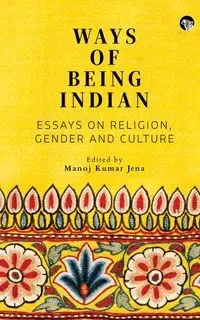Ways of Being Indian - Jena Manoj Kumar
- Essays on Religion, Gender and Culture
Identity formation in non-western societies involves paradox, as doctrines
are frequently overridden by actual practices. The essays in this volume
discuss different ways in which identities are constructed in unique 'Indian'
contexts.The emergence of deras in Punjab reflects how continuing caste
inequality and divergence over spiritual leadership has affected the egalitarian
spirit of Sikhism, contradicting a basic feature of the faith-the tradition
of common worship. In the matrilineal Khasi community, men-looking to
gain equal inheritance rights-use arguments of ethnic purity and indigenous
rights to downsize women's autonomy and undermine the commanding
socio-economic position that their own tradition gives them.
For male sex-workers, their profession, paradoxically, becomes a means
of sexual autonomy in the otherwise heteronormative world that they
inhabit. A different kind of paradox marks the social lives of many Indian
women: in Assam for instance, celebration of menstruation coexists with
prohibition on menstruating women's entry into temples and participation
in auspicious events.
Workplace violence exemplifies how private biases infiltrate public spaces,
reinforcing traditional marginalities, undeterred by legal safeguards.
Similarly, the plight of indentured plantation workers in Malaysia
demonstrates the operation of traditional patriarchy inside a foreign and
highly sequestered workspace of plantations-within these spaces, women
experience 'double marginalization'. And the government and middleclass
response to the COVID-19 pandemic across India demonstrated the
persistence of traditional biases which perpetuate inequality and oppression
in the world's largest democracy.
Comprising these and other discussions on the everyday lived realities
of individuals and communities in India and the Indian diaspora,
Ways of being Indian is a remarkable, eye-opening collection.
EAN: 9789354479250




Identity formation in non-western societies involves paradox, as doctrines
are frequently overridden by actual practices. The essays in this volume
discuss different ways in which identities are constructed in unique 'Indian'
contexts.The emergence of deras in Punjab reflects how continuing caste
inequality and divergence over spiritual leadership has affected the egalitarian
spirit of Sikhism, contradicting a basic feature of the faith-the tradition
of common worship. In the matrilineal Khasi community, men-looking to
gain equal inheritance rights-use arguments of ethnic purity and indigenous
rights to downsize women's autonomy and undermine the commanding
socio-economic position that their own tradition gives them.
For male sex-workers, their profession, paradoxically, becomes a means
of sexual autonomy in the otherwise heteronormative world that they
inhabit. A different kind of paradox marks the social lives of many Indian
women: in Assam for instance, celebration of menstruation coexists with
prohibition on menstruating women's entry into temples and participation
in auspicious events.
Workplace violence exemplifies how private biases infiltrate public spaces,
reinforcing traditional marginalities, undeterred by legal safeguards.
Similarly, the plight of indentured plantation workers in Malaysia
demonstrates the operation of traditional patriarchy inside a foreign and
highly sequestered workspace of plantations-within these spaces, women
experience 'double marginalization'. And the government and middleclass
response to the COVID-19 pandemic across India demonstrated the
persistence of traditional biases which perpetuate inequality and oppression
in the world's largest democracy.
Comprising these and other discussions on the everyday lived realities
of individuals and communities in India and the Indian diaspora,
Ways of being Indian is a remarkable, eye-opening collection.
EAN: 9789354479250

